Photographs: Reuters Aditi Phadnis in New Delhi
Gujarat has been in the news for three reasons this month.
The first is, of course, the Vibrant Gujarat investment festival coinciding with the Makar Sankranti season in the state.
With the exception of Infosys and Wipro -- for which Gujarat is readying a different kind of entrepreneur and Chief Minister Narendra Modi is confident that given time, they will be in Gujarat too -- everyone who is anyone in industry was in the state networking, raising money and investing.
Investment amounting to lakhs of crores (trillions) has been promised. The accent is on 'promised', the Opposition points out.
. . .
Gujarat is growing fast, and for a good reason
Image: Gujarat Chief Minister Narendra Modi.Photographs: Sanjay Sawant/Rediff.com
Industry, on the other hand, is clear. One Bharatiya Janata Party-minded investor compared Modi to the third in the trinity of 'Vivekanand and Gandhi'. Poverty of philosophy? Maybe. But industry thinks so.
The second event went unreported in the national press but Dalit activists thought it was important enough to disseminate around the world.
Dalit rights NGOs reported that for the first time in Gujarat and possibly the entire country, a newspaper editor was arrested under the Scheduled Castes and Tribes (Prevention of Atrocities) Act, 1989 and kept behind bars for one full day and night. Seventy-five per cent of cases around the country under this law end in acquittal.
In Gujarat, not only was the FIR filed, but successfully pursued. The accused was granted bail but had to stay in jail till the bail hearing was held.
. . .
Gujarat is growing fast, and for a good reason
Photographs: Reuters
This is the unexpurgated version of what the publication wrote: "In ancient times parents used to send their children to listen to lectures of saints to provide them good company. Children used to visit forest-school (tapovan) for education. In forest-school virtuous rishi munis shaped their characters. In modern times children go to schools, where they come in to contact of children of 'inferior caste' and learn bad manners. In present day schools children having inherited bad manners also come to be educated with sons of 'reputed families'. They definitely affect sons of reputed families. In past, only Brahmins were chosen as teachers in pathshalas. Nowadays, even people of 'backward caste' become teachers by getting benefits of reservation. These teachers cannot teach good behaviour to children."
The third time Gujarat made the headlines was when Maulana Vastanvi, the newly appointed rector of Darul-Uloom Deoband, said in an interview there is 'no discrimination against the minorities' in Gujarat. Islamic groups in India and abroad are furious at his statement and the Maulana is under pressure to apologise.
The three instances come together to illustrate new -- and some old -- realities about the state. Gujarat and Gujaratis have always understood money better than the rest of India.
Congress leader Madhusudan Mistry and leader of the Opposition in Gujarat Assembly, Shaktisinh Gohil said so in Burari and used this intelligence to attack Modi ("he's promised a lot of money for the state. But where is it?").
. . .
Gujarat is growing fast, and for a good reason
Photographs: Reuters
The question is, why is Gujarat getting the money now? A former Indian Administrative Services officer who is now a private sector advisor on infrastructure was blunt: "In my mind, Godhra equals 1984. What is then the differentiator between previous Congress governments and the present BJP one? The performance of the chief minister and the administration."
"There are two things you have to hand to Modi: He might accept money for the party, but he never asks for money for himself and will not allow his colleagues to make money either; and he's a nitty-gritty man -- nothing is left to the imagination of the bureaucracy (for which he doesn't have much time anyway) so there is no space for exercising discretion. Every detail is seen through by him," he added.
The closest comparison was with another BJP chief minister, Raman Singh in Chhattisgarh, whose state is also considered a frontline performer. Raman Singh is laid back and believes in living and letting live, but Modi's style is perform or perish.
Modi's power sector reforms appear to have impressed the most. Power utilities have successfully separated the domestic and agricultural feeders. This has ensured that both sectors get a fair share of power with a regularity that was not possible earlier.
. . .
Gujarat is growing fast, and for a good reason
Photographs: Reuters
Gujarat's state GDP is 11 per cent and agricultural growth is 9.6 per cent. Power is essential. But so is land. So how does Modi cope with the rising demand for land from industry and the compulsion of high agricultural growth?
Gujarat has a law under which non-farmers cannot buy agricultural land, and if a farmer sells his land and does not register the purchase of fresh agricultural land in three years, he loses the right to be called a farmer.
So everywhere Modi goes, he tells villagers: "Don't sell your land; and if you do, buy more agricultural land." Farmer versus industry agitations are gaining ground in the state; but so is prosperity.
Farmers in Sanand protested against land acquisition -- and how? By not sending their children to school.
. . .
Gujarat is growing fast, and for a good reason
Photographs: Paresh Gandhi/Rediff.com
Modi's social project is gaining ground. When Vibrant Gujarat was on, by day he would sign MoUs. And come evening, he could be found in Dalit bastis in Ahmedabad, flying kites with children, interacting with people.
Muslims do complain of discrimination. But they say the pace of development in their area is not as fast as in the Hindu areas.
Gujarat is growing fast. The rest of India has to trust, verify, but as Maulana Vastanvi pointed out, grow up as well.

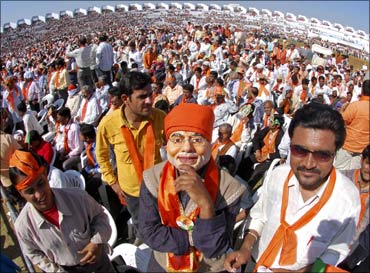
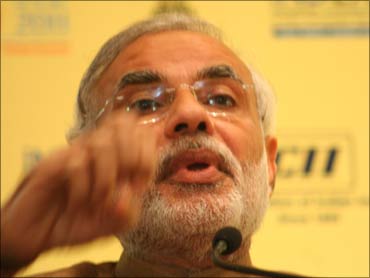
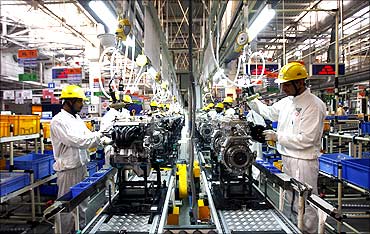
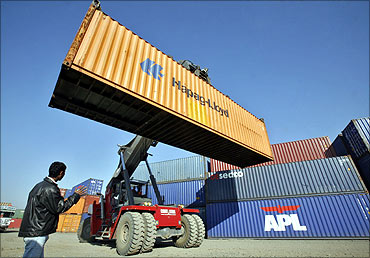

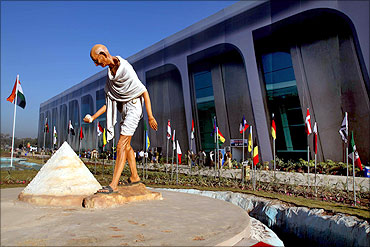

article